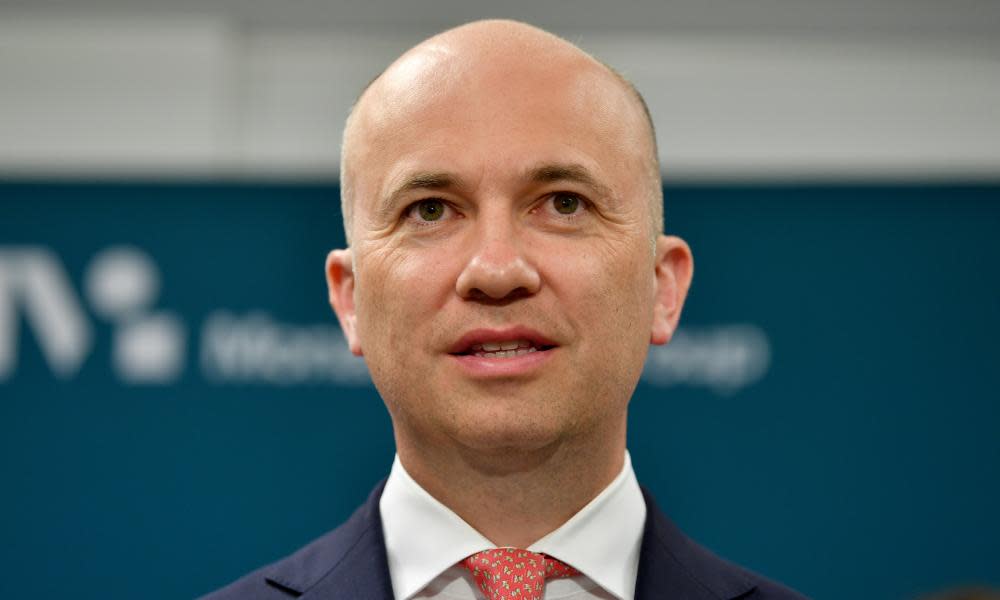NSW plan to offer emissions offsets with car registration sends wrong message, critics say

Drivers in New South Wales will be offered the chance to buy carbon offsets when they renew their car registration in a step critics have described as a “gimmick” that could undermine efforts to cut transport emissions.
The NSW treasurer and energy minister, Matt Kean, announced the scheme on Friday saying it would give people “looking for practical ways to take action on climate change” more ways to cut their emissions.
“More and more NSW drivers are opting for electric vehicles each year, however this scheme gives those drivers who haven’t made the switch yet the option to offset their emissions instead,” he said.
When drivers of light vehicles receive their registration renewal, they will be offered the option to buy between $5 and $200 worth of Australian carbon offset credits. No overseas offsets would be bought.
Related: Australian councils told to cut emissions rather than spend millions on overseas carbon offsets
Kean said buying $80 of credits was the equivalent to offsetting 2.4 tonnes of CO2 – the average annual emissions of a light vehicle in the state.
The transport sector was responsible for 22% of the state’s greenhouse gas emissions, with half of that coming from passenger vehicles, Kean said.
But critics have lambasted the scheme for potentially deterring people from reducing their emissions.
“This creates completely the wrong impression for consumers,” Bill Hare, an Australian climate scientist who advised the UN on appropriate use of offsets, said. ”It is a real concern to see the New South Wales government legitimising this through an official scheme.
“At worst that could undermine people’s intent to find ways to reduce emissions from driving. Offsets don’t really reduce emissions, and they don’t compensate for an emission of carbon dioxide coming out of the tailpipe of a car.”
He said the NSW government should focus on a more rapid rollout of electric vehicle charging infrastructure rather than promoting “gimmicks such as offering to offset drivers emissions per year for $80”.
Hare said the best ways for people to cut their transport emissions are to use more public transport, bicycles and to get an electric vehicle.
“New South Wales has a good set of policies here but these could be strengthened to make it easier for people in different circumstances to move to electric cars,” Hare said.
Dr Jennifer Rayner, head of advocacy at the not-for-profit Climate Council, said public transport improvements and steps to make it easier for people to walk and ride were two key changes to shift people “away from polluting cars altogether”.
“Given the range of clean transport options that are readily available, the focus for this sector should be on achieving near absolute zero emissions. This means getting as close to zero emissions as possible with minimal use of offsetting or ‘net zero’ accounting,” Rayner said.
She said Australia was one of the only OECD countries – alongside Russia – that did not have fuel efficiency standards for new vehicles, which made the country “a dumping ground for expensive, polluting petrol and diesel cars”.
Polly Hemming, director of the climate and energy research program at the Australia Institute, said the state government was “promoting the idea that you can just cancel out fossil fuel emissions” and this risked delaying the switch to low emissions transport.
The use of carbon offsets has become increasingly controversial, with questions outstanding over whether some Australian tree-planting and forest regeneration projects have actually cut emissions.
John Connor, chief executive of the Carbon Market Institute which represents stakeholders in the carbon offset industry, said there was “clearly more to be done” on transitioning transport away from fossil fuels.
But he said this transition could not happen overnight and it was “unhelpful to simply dismiss offsetting” which, he said, was an important tool available for consumers to take responsibility for emissions.
Making the announcement, the NSW government said it had appointed Corporate Carbon Advisory as the offset provider for the vehicle scheme and regeneration projects across the state would be supported.
The scheme was part of the government’s zero emissions transport strategy, the government said, that included $209m for EV charging infrastructure.
Stamp duty had been removed for EVs costing less than $78,000 and EVs costing less than $68,750 are eligible for a $3,000 rebate, the government said.

 Yahoo Movies
Yahoo Movies 
